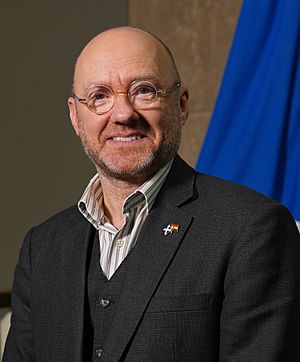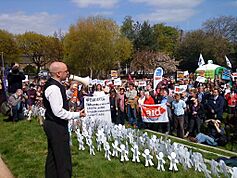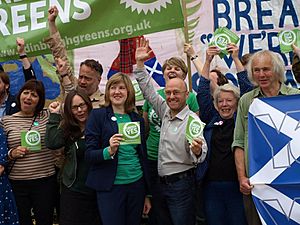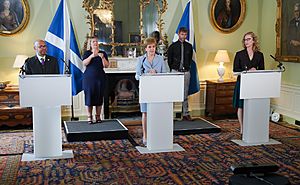Patrick Harvie facts for kids
Quick facts for kids
Patrick Harvie
|
|
|---|---|

Official portrait, 2023
|
|
| Minister for Zero Carbon Buildings, Active Travel and Tenants' Rights | |
| In office 31 August 2021 – 25 April 2024 |
|
| First Minister | Nicola Sturgeon Humza Yousaf |
| Preceded by | Office established |
| Succeeded by | Office abolished |
| Co-Leader of the Scottish Greens | |
| Assumed office 22 September 2008 Serving with Lorna Slater
|
|
| Alongside |
|
| Preceded by | Robin Harper |
| Member of the Scottish Parliament for Glasgow (1 of 7 Regional MSPs) |
|
| Assumed office 1 May 2003 |
|
| Scottish Green portfolios | |
| 2016–2021 | Finance, Economy, Fair Work and Equalities |
| 2021 | Finance and the Constitution |
| Personal details | |
| Born | 18 March 1973 Vale of Leven, Dunbartonshire, Scotland |
| Political party | Scottish Greens |
| Alma mater |
|
| Website | Official website: https://greens.scot/patrick-harvie-msp |
Patrick Harvie (born 18 March 1973) is a Scottish politician. He is one of the co-leaders of the Scottish Greens and has been a Member of the Scottish Parliament (MSP) for the Glasgow area since 2003.
From 2021 to 2024, he served as the Minister for Zero Carbon Buildings, Active Travel and Tenants' Rights. This made him one of the first Green politicians in the United Kingdom to become a government minister.
Harvie was born in Dunbartonshire and went to university in Manchester. He became involved in politics through campaigning for equality. This experience led him to join the Scottish Green Party. In 2021, the Scottish Greens and the Scottish National Party (SNP) agreed to work together in government. This is when Harvie became a minister. He left the government in 2024 when the agreement ended.
Contents
Early Life and Education
Patrick Harvie was born on 18 March 1973 in Vale of Leven, Dunbartonshire. He grew up in a family that was very interested in politics. As a child, he was even taken to demonstrations for the Campaign for Nuclear Disarmament.
Harvie went to Dumbarton Academy from 1984 to 1991. After high school, he studied at Manchester Metropolitan University. For a short time, he was a member of the Labour Party.
Before becoming a politician, Harvie worked for a health organization. His work there involved him in campaigning for equality for all people. He also worked for a short time as a civil servant for the Inland Revenue.
Beginning a Career in Politics
Harvie became more active in politics after taking part in a successful campaign to change a law known as Section 28. This experience inspired him to join the Scottish Green Party.
In the 2003 Scottish Parliament election, Harvie was elected as a Member of the Scottish Parliament (MSP) for the Glasgow region. An MSP is a politician elected to represent people in the Scottish Parliament.
Member of the Scottish Parliament
As a new MSP, Harvie quickly became known for his work. He campaigned on issues important to the Green Party, like protesting a new motorway in Glasgow. He also worked on other issues, such as opposing the UK's proposed Identity Cards Bill.
He was a member of the Scottish Parliament's Communities Committee for many years. In this role, he worked on laws related to housing, charities, and community safety. He also focused on problems like homelessness and debt. In 2004, he won the 'One to Watch' award at the Scottish Politician of the Year event.
Co-leader of the Scottish Greens
In September 2008, Harvie became the male co-convenor (now called co-leader) of the Scottish Greens. He served alongside several female co-convenors over the years, including Eleanor Scott and Maggie Chapman. In 2019, the party changed its rules, and he was elected as co-leader alongside Lorna Slater.
Working with the SNP
After the 2007 election, the Scottish Greens agreed to work with the Scottish National Party (SNP), which was in government. This allowed Harvie to become the head of the Transport, Infrastructure and Climate Change Committee.
Even though he worked with the SNP, he still disagreed with them on some issues. He continued to oppose large building projects like the M74 motorway. He believed the government should focus more on renewable energy projects.
2014 Independence Referendum
Harvie supports Scottish independence. He was part of the Yes Scotland campaign for the 2014 Scottish independence referendum. He campaigned with other politicians like Nicola Sturgeon.
He said his reason for supporting independence was to create a "vision of Scotland as a peaceful country with social justice, equality and environmental protection at its core."
Brexit and a Future Referendum
In the 2016 Brexit referendum, Harvie campaigned for the UK to stay in the European Union. After the UK voted to leave, he said that Scotland should have the option of another independence referendum to protect itself from the effects of Brexit.
Working in Government
In the 2021 Scottish Parliament election, the Scottish Greens won eight seats, their best-ever result. After the election, the Greens and the SNP made a power-sharing deal called the Bute House Agreement. This meant that Green politicians would become government ministers for the first time in UK history.
On 30 August 2021, Harvie was made the Minister for Zero Carbon Buildings, Active Travel and Tenants' Rights. His co-leader, Lorna Slater, also became a minister.
Protecting Tenants
As a minister, Harvie introduced a "New Deal for Tenants." This plan included ideas like rent controls to stop rents from rising too quickly and more protection for people renting their homes.
In 2022, he introduced an emergency law to freeze rents and ban evictions to help people during the cost of living crisis. This was the first time a Green minister had introduced a law in the UK.
Zero Carbon Buildings
Harvie also worked on plans to make buildings in Scotland more environmentally friendly. His proposals included requiring homes to meet new energy efficiency standards by 2033. The plans also aimed to replace gas boilers with greener heating systems by 2045.
Leaving Government and Future Plans
In April 2024, First Minister Humza Yousaf ended the Bute House Agreement. This meant that Harvie and Slater were no longer government ministers.
In April 2025, Harvie announced that he would not run for re-election as co-leader of the Scottish Greens in the party's 2025 leadership election. However, he plans to run for re-election as an MSP in the 2026 Scottish Parliament election.
Political Beliefs
Harvie is a supporter of Scottish republicanism. This means he believes that if Scotland becomes independent, it should have an elected head of state instead of a monarch. He has been critical of the British monarchy.
Personal Life
Harvie is a supporter of open source and free software, and he uses the Linux operating system. He is a member of many organizations, including Greenpeace, Friends of the Earth, and the Campaign for Real Ale.
For four years, he wrote a weekly column for the Scottish version of the Big Issue magazine. In 2008, he was a candidate in the election for Rector of the University of Glasgow.
Images for kids
 | Sharif Bey |
 | Hale Woodruff |
 | Richmond Barthé |
 | Purvis Young |






